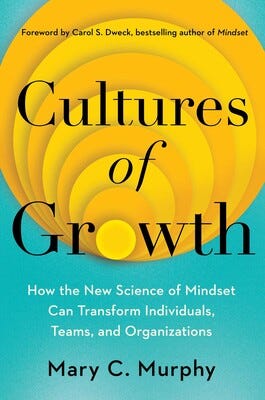Cultures of Growth: An interview with Mary Murphy
Issue 109: Mary Murphy on how culture impacts the mindsets and performance of people within teams and organizations.
One of the cores themes of our newsletter is understanding how organizations and teams fail and what we can do to make them run more smoothly. In a new book, CULTURES OF GROWTH, our colleague Professor Mary Murphy argues that organizations and teams geared toward growth inspire deeper learning, spark collaboration, spur innovation, and build trust necessary for risk-taking and inclusion. Members of these groups are less likely to cheat, cut corners, or steal each other’s ideas. In growth-oriented cultures, great ideas come from people from all backgrounds and at all levels — not just those anointed as brilliant or talented.
Jay recently shared a meta-analysis (an analysis of 63 studies) that was quite critical of growth mindset interventions. It suggested that many of the short-term growth mindset interventions used in classrooms have limited effects on student outcomes. This led to a thoughtful conversation with Mary and why her approach her is a bit different from most of the literature on mindsets — she is focused on the broader cultural factors that foster growth such as social norms, practices, and leadership. She says,
“Contrary to what we’ve believed to this point, the fixed and growth mindset aren’t simply beliefs in our minds – mindset is also a product of our environment and interactions with each other.”
This is very similar to what we have been arguing for years about identity and beliefs in our book and in this newsletter! In our view, a focus on cultural change such as changing norms is likely a far more potent approach for positively affecting the behavior of individuals, organizations, and communities. Of course, changing culture is much harder, but this book provides insight into that process.
Mary’s upcoming book, Cultures of Growth: How the new science of mindset can transform individuals, teams and organizations, offers a culture change approach to creating groups, teams, schools, and organizations that inspire learning, growth, and success. For years, Mary (a Professor at Indiana University), her lab and collaborators have been redefining mindset as a cultural feature of relationships, groups, teams, organizations and schools. Her work suggests that while fixed-minded Cultures of Genius can dampen collaboration, innovation, diversity and inclusion, development-oriented Cultures of Growth bring out the best in people and groups. We recently interviewed her about these topics.
What does your book teach us about social identity or group dynamics?
Cultures of Growth dives deep into the group dynamics that create growth-minded cultures in schools, teams, workplaces, and in our daily interactions and relationships. Contrary to what we’ve believed to this point, the fixed and growth mindset aren’t simply beliefs in our minds – mindset is also a product of our environment and interactions with each other. The groups or cultures that we’re a part of have a tremendous influence on whether we inhabit our growth or fixed mindset at any given time.
Contrary to popular belief, we don’t have one mindset or another—we all have both and we move between our fixed and growth mindset based on predictable situations (what I call “mindset triggers”) and the larger team and organizational culture that surrounds us. As my research shows, we’re likely to adopt the prevailing mindset in the context around us. That doesn’t mean we’re at the mercy of our surroundings; we can all take steps to actively embody our growth mindset if we’re in a more fixed-minded culture, and we can also influence the mindset culture. But each of these requires that we’re first aware of the influence of the group.
What is the most important idea readers will learn from your book?
There have been important misconceptions about mindset that have proliferated as the concept has been applied in education and business settings. One major misconception is the notion that we all have either a fixed or a growth mindset (and growth mindset is better than fixed). In reality, we all have both. Our mindset exists on a continuum, and we tend toggle back and forth based on a few common and predictable situations. For instance, my research has identified four key mindset triggers that tend to set us moving along the continuum.
The most important things readers will learn from this book is how to identify their own mindset triggers and how to shift toward growth more of the time. Through case studies, stories, and research examples, they will also learn how specific and actionable practices, policies, norms, and interactions shape the mindset culture of groups, families, teams, schools, and workplaces which will help people build their own Cultures of Growth in the important relationships of their lives.
Why did you write this book and how did writing it change you?
I wrote this book both to help dispel some of our misconceptions about mindset and to share these new insights about the fact that mindset isn’t just something that lives inside people’s heads – groups, teams, classrooms, and organizations have their own mindset culture. In my decade of research on this topic and in writing the book, I realized just how toxic the old mythology around mindset can sometimes be.
Specifically, with our hyper-focus on individual agency, we’re told that if something’s wrong, we just need to fix our mindset. That it’s all up to us. That’s a common meme throughout the self-help and personal development industry. And there’s truth to that in that we are do have the ability to create change. Yet when we focus entirely on the individual, we completely overlook the influence of the surrounding culture, and that means our personal efforts can only get us so far. Our research shows that people can have the strongest possible growth mindset personally, but if they are embedded in a fixed-minded Culture of Genius, they will not have opportunities to use or benefit from their growth mindset.
Writing the book changed me by exposing me to so many people—everyday people and those in more formal leadership positions—who are trying to shift from a fixed-minded Culture of Genius to a development-oriented Culture of Growth. By hearing their stories and learning what worked in these contexts—and how it dovetailed with the literature and research base, I became convinced that creating Cultures of Growth in our families, groups, teams, schools, and organizations could change the world for the better.
What will readers find provocative or controversial about your book?
I think perhaps the most provocative idea is that individual performance is less about the individual and more about the environment than organizational leaders realize. In this day and age where we’re always talking about maximizing employee engagement and productivity, we’re still largely focused on what we can get out of people. We rate each person’s performance without analyzing what supports and resources they’re being given. It’s what Patagonia’s VP of HR Dean Carter calls an extraction model. That’s a fixed-mindset approach where employees have to prove that they either have it or they don’t, and it actually nets worse results both at the individual and the organizational level.
Ironically, Cultures of Genius produce less genius. When everyone is in prove-and-perform mode, people are competing to show that they are the smartest one in the room. So, it’s no surprise that while people within strong Cultures of Genius are infighting and watching their backs, those in strong Cultures of Growth are getting ahead together. Cultures of Growth look to how they can help people continually grow and develop, understanding that when this happens, they’re more likely to innovate, use data and take informed risks, to work cooperatively, and, as a direct follow-on, to achieve better results.
Do you have any practical advice for people who want to apply these ideas (e.g., three tips for the real world)?
Identify your mindset triggers and the triggers of those you interact with. There is a quiz on my website (marycmurphy.com) where people can examine their triggers in different scenarios. By identifying our triggers, we can shape situations to embody the mindset that’s most useful in the moment:
Evaluative Situations
High Effort Situations
Critical Feedback
Success of Others
We’re all culture creators, so consider how you’re contributing to the cultures you’re a part of, whether you’re a leader, mentor, manager, or member. Ask yourself whether you’re helping to foster a Culture of Growth or a Culture of Genius?
James Dyson famously created 5,126 (failed) protoypes of his cyclonic vacuum. He kept going because he knew that each iteration was one step closer to success. Start embracing your mistakes. One of the most challenging aspects of a fixed-minded Culture of Genius is that it views failures or mistakes as making a pronouncement about our innate talent and abilities. If we mess up, we think we must not “have it.” Instead, we can start seeing failures as opportunities to learn, so we can do better next time. This decreases the pressure on us, which makes us feel free to try new things and be creative, to stretch ourselves. If we fail, that’s okay. It doesn’t mean we won’t succeed, just that we haven’t yet. And we can mine those missteps for learning to get us to our goals. What’s your favorite mistake from today?
You can order Cultures of Growth here (as well as any of the links to the book above).
News and Updates
Jay guested on a Cigna Health podcast last week! In the episode, Host Holly Robinson Peete is joined by C-suite executive Victoria Pelletier to discuss the unseen challenges Victoria has faced at work. Jay also discusses the importance of these challenges and what they mean for the health of employees and of organizations.
Listen to the full episode here!
—
Jay also recently delivered a keynote address to 400 educators at The American Montessori Society’s Annual Conference! Below is a cool work of art that summarizes the themes from the talk, created while he gave the talk!
Catch up on the last one…
With many of threats to democracy and the impacts of polarization looming large over the 2024 election, this issue seems more urgent than ever. We highlight our past podcast and video on this topic and offer two of the most effective interventions for reducing affective polarization.
Is polarization really a problem?
With the US Presidential Election on the horizon, there has been a great deal of discussion about the corrosive effects of political polarization and the potential threat to democracy. A new Ipsos poll suggests that nearly one quarter of Americans think political extremism and threats to democracy are two of the biggest threats facing the country. This …







Very glad you called out the murky science of 'growth mindset' as context for this discussion. When I saw the book title I winced so it's good to read the discussion informed by that reservation.